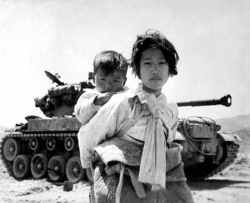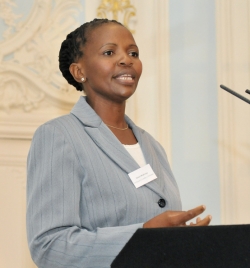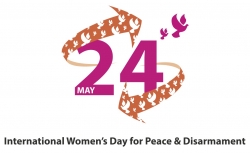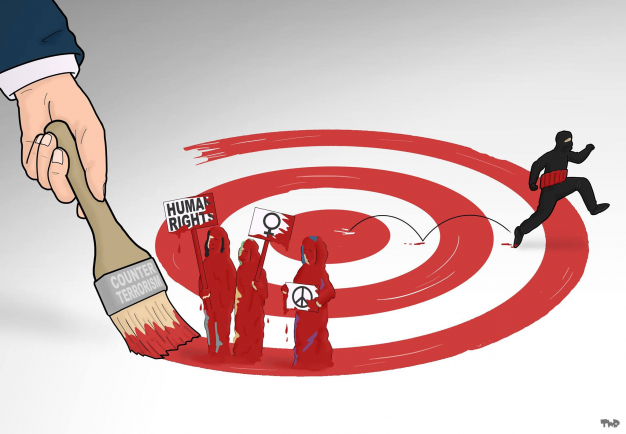On the 20th celebration of International Women's Day for Peace and Disarmament (May 24), WPP is very excited about the organizing and its participation in the ‘Women’s Walk for Peace in Korea', initiated by Women Cross DMZ. On May 24, 2015, WPP's International Advisory Council Member Netsai Mushonga will walk together with 29 international women peacemakers from around the world and Korean women, north and south, to call for an end to the Korean War and for a new beginning for a reunified Korea. The hope is to cross the 2-mile wide De-Militarized Zone (DMZ), which separates millions of Korean families and divides both Korea’s already for 70 years, as a symbolic act of peace. In this column, Netsai shares her personal motivation of walking in solidarity with the Korean women and why this initiative is of key importance for peace.
With Netsai Mushonga participating on behalf of WPP, we will keep you up-to-date with first-hand stories from this inspiring initiative in Korea! Follow our updates on Twitter and Facebook.
 I will be joining twenty-nine great women peacemakers to cross the Demilitarized Zone (DMZ) between North and South Korea during 2015 Women Walk for Peace in Korea on the International Women’s Day for Peace and Disarmament, 24th of May 2015. The International Women’s Day for Peace and Disarmament is a day set aside for women to raise their voices in support of peace and reduction of weapons production and sale. I volunteered to embark on this trip and have no doubt whatsoever on its importance and impact. It is my strong conviction that we are doing the right thing; being in solidarity with our fellow Korean women, engaging governments of Korea and reminding them that technically they are still at war, 70 years after the guns went silent, reminding the world that a several million families were separated, a couple million dollars are spent monitoring the demilitarized zone and nudging the world for a change.
I will be joining twenty-nine great women peacemakers to cross the Demilitarized Zone (DMZ) between North and South Korea during 2015 Women Walk for Peace in Korea on the International Women’s Day for Peace and Disarmament, 24th of May 2015. The International Women’s Day for Peace and Disarmament is a day set aside for women to raise their voices in support of peace and reduction of weapons production and sale. I volunteered to embark on this trip and have no doubt whatsoever on its importance and impact. It is my strong conviction that we are doing the right thing; being in solidarity with our fellow Korean women, engaging governments of Korea and reminding them that technically they are still at war, 70 years after the guns went silent, reminding the world that a several million families were separated, a couple million dollars are spent monitoring the demilitarized zone and nudging the world for a change.
Growing up, I did not understand my indignation towards war and violence until an incident occurred whilst I was in Chiang Mai, Thailand for a Nonviolent Peace Force Training. Our training center was located at a comfortable rural resort where a helicopter passed every hour. Feelings of trepidation and distress began to creep in and a deep sense of insecurity settled within me. I was ready to flee each time the helicopter passed. This reminded me of the period I was born, the time when Zimbabwe was in its liberation war for independence. The war started in 1963 and ended in 1979. The first ten years of my life were spent in this brutal war that killed an estimated one million people. The government soldiers would come and inflict abuse and the guerrilla fighters would follow and threaten and punish actual and suspected sell outs, mostly through brutal executions.
 In 1977, I lived through the darkest 12 hours of my life, in the morning my 10 year old sister dragged the three of us to bath and wash clothes in the river that cut across our village. After undressing and washing our clothes we hung them on the nearby bushes to dry in the sun. We began bathing and suddenly heard deafening sounds of explosions, rapid machine gun fire and the distinctive drill of helicopters and war planes. We all scrambled up and fled away from the river. My sister led the way and whilst the three of us followed behind, believing that we were going to be shot or bombed. As we approached a clearing, a helicopter took interest in us and hovered lower to take a closer look. I could see a soldier sitting by the doorway, pointing his gun at us. I then remembered we had forgotten to wear any clothes when we left the river. We kept moving and the helicopter seemed to lose interest and drifted away. After securing shelter in the nearest house we could find, we slipped under the blankets. The bombing and gunfire went on for the next 11 hours, the choppers, bomber and fighter planes kept cycling the sky like vultures, their engines inspiring fear and making death certain for me and my siblings on that day.
In 1977, I lived through the darkest 12 hours of my life, in the morning my 10 year old sister dragged the three of us to bath and wash clothes in the river that cut across our village. After undressing and washing our clothes we hung them on the nearby bushes to dry in the sun. We began bathing and suddenly heard deafening sounds of explosions, rapid machine gun fire and the distinctive drill of helicopters and war planes. We all scrambled up and fled away from the river. My sister led the way and whilst the three of us followed behind, believing that we were going to be shot or bombed. As we approached a clearing, a helicopter took interest in us and hovered lower to take a closer look. I could see a soldier sitting by the doorway, pointing his gun at us. I then remembered we had forgotten to wear any clothes when we left the river. We kept moving and the helicopter seemed to lose interest and drifted away. After securing shelter in the nearest house we could find, we slipped under the blankets. The bombing and gunfire went on for the next 11 hours, the choppers, bomber and fighter planes kept cycling the sky like vultures, their engines inspiring fear and making death certain for me and my siblings on that day.
Twenty-four people were killed in my village, among them two children who were playing under a mango tree, and two adult men whom I knew and respected. In my adulthood I still feel the chill when a helicopter passes by whether I am in the office, at an airport, at home or anywhere. For me war is synonymous with death, human rights abuses and huge financial and human resources drain. I will leave no stone unturned to reduce chances of war and violence anywhere in the world and pledge to be in solidarity with women struggling for peace.
During May 24, 2015, I choose to be in solidarity with women of Korea who are struggling for peace and re-unification.
For more information about the 2015 Women's Walk for Peace in Korea, visit the Women Cross DMZ website
"I like to work with and support WPP because there is so much violence in the world and we need holistic peace. WPP is supporting gender sensitive peace where women and men partner and transform societies for peace."
Netsai Mushonga is a development, women rights, gender and peacebuilding consultant. In 2014-2015, Netsai worked as a consultant/full time employee with the Centre for Conflict Resolution in South Africa. Between 2003 and 2013 Netsai was the National Coordinator of the Women’s Coalition of Zimbabwe, the network of 72 women’s rights NGOs and individuals across Zimbabwe. She grew the network from 24 to 72 member organizations and coordinated the successful campaigns for a Domestic Violence Act and for a gender sensitive constitution. Since 2000 Netsai has facilitated gender and peacebuilding, economic empowerment and gender-based violence training for female and male leaders in government and civil society in Zimbabwe, Southern Africa, East and West Africa, the Middle East and North Africa region, Asia, Europe and the United States of America. She has a strong background in peace and conflict resolution work, having been a board member of the International Fellowship of Reconciliation (IFOR) and later the Women Peacemakers Program Africa Region. Netsai was a participatory trainer in several WPP Training of Trainer Cycles in MENA region, Latin America and Asia.
11 Dec '17 This month WPP staff interviewed Arbia Jebali and Sarah Chamekh from Free Sight Association in Tunisia about the work their organization does, how civil society space has changed over the years, which challenges they are facing now, and how civil society in Tunisia is organizing itself to overcome those challenges.
7 Nov '17 In this article, WPP staff interviewed Doron Joles of XminY Fund, an activist organization that supports social movements, action groups and changemakers fighting for a fair, democratic, sustainable and accepting world. He discusses the unique way they have chosen to hand out funds, and the challenges that go along with funding small activist organizations in the current global climate.

25 Oct '17 This Friday, the UNSCR 1325 Open Debate will take place once again, seventeen years since the adoption of landmark UN Security Council Resolution 1325 on Women, Peace and Security. In this article WPP staff reflects on the progress made for a truly transformative feminist peace agenda until now.
